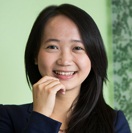 Instead of going home to Brooklyn, Cuiping “Becky” Deng spent last summer in Binghamton investigating the possibilities of solar energy storage.
Instead of going home to Brooklyn, Cuiping “Becky” Deng spent last summer in Binghamton investigating the possibilities of solar energy storage.
As a participant in a National Science Foundation-funded Research Experience for Undergraduates (REU) program, Deng worked closely with a doctoral candidate at the Center for Autonomous Solar Power. For nine weeks, she worked alongside Navjot Kaur Sidhu, building and testing a capacitor that could point the way toward the next generation of energy-storage devices.
“Navjot was very helpful, teaching me how to use all this equipment, how to analyze my data, how to present my findings in a poster,” says Deng, a Binghamton University senior majoring in electrical engineering. “She guided me along, step by step, and once I learned how to actually do that first experiment, she let me mix the chemicals and do the rest by myself. That was the most important lesson, to learn how to work independently.”
Using a combination of metal oxides and conducting polymers, Sidhu is trying to develop a low-cost, high-density, long-lasting supercapacitor to store energy for a variety of applications, especially solar power. Through her own research, Deng has found working examples of supercapacitors that provide energy for solar-powered streetlights in Japan and solar-powered buses in China, where she lived until 2007, when her family moved to New York City.
“This is a very advanced technology, very exciting,” says Deng, who is considering staying in Binghamton for a master’s degree, with a focus on biofuel cells. “When I went to apply for the REU program, this was my first choice, from the beginning. I felt like, ‘Wow, I really want to do this,’ and someday I hope I can apply this knowledge to my own research.”
This year, Deng will continue working with Alok Rastogi, who supervises Sidhu’s research. “I was immediately impressed by her talent for research-oriented projects, and the excitement she felt about this project was exceptional,” says Rastogi, an associate professor of electrical and computer engineering. “For an undergraduate to show such an inclination is remarkable. She will lead a team of three students in a senior design project, and I know she is going to do well. I’m counting on her.”
Mark Fowler, a professor of electrical and computer engineering, has hired Deng as a teaching assistant. “She’s great to work with, one of our best students,” he says. “She was at the top of the class last year, and this year she’s helping in that same class. She’s strong academically and thinks very logically. But the thing that really stands out is the eagerness she projects in everything she does.”







